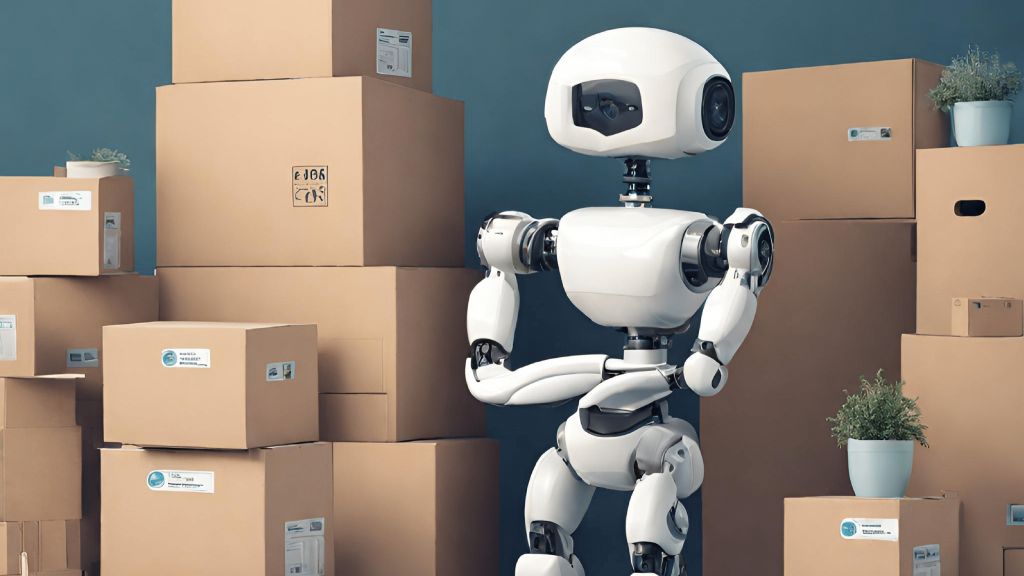The moving industry, though often perceived as traditional and resistant to change, is undergoing a technology-fueled transformation.
At the forefront of this metamorphosis is Artificial Intelligence (AI), with its astounding ability to optimize processes, uncover insights, and elevate customer experiences. AI integration in relocation services is steadily reshaping operations, interactions, and strategic planning.
As AI algorithms continue learning by processing troves of data, they are catalyzing innovation across the moving sector. From inventory management to route planning, communications to analytics, AI is revolutionizing how packing and relocation companies function.
Those embracing this shift are already experiencing expanded reach, operational excellence, and higher profitability.
Let’s explore the key aspects where AI is revamping the moving industry.
Spotlight on Agoyu: AI Innovation to Aid Consumers and Movers
Embedded at the intersection of moving and technology is Agoyu, an AI-based moving-solutions platform. Offering a suite of AI-driven applications, Agoyu showcases how artificial intelligence can uplift efficiency and experiences across the relocation process.
Smart Weight and Size Calculation for Accurate Quotes
A prime offering from Agoyu is using AI visual analysis for possessions measurement. As customers submit images/videos of items, computer vision technology registers the dimensions, volume, and categories of goods, while proprietary algorithms calculate weights.
As you can see in the video above, Agoyu’s technology allows you to simply scan a room and the AI will identify what’s in the room and it’s size and weight based on the data it captures.
This instant furniture and inventory audit minimizes excessive boxes or trips. Further, the accurate weight estimates enable realistic quotes binding for movers and clients, creating amicable transactions.
Logistics Made Agile with Real-Time Tracking
Agoyu partners with movers who have real-time tracking, our movers have their own trucks and advanced tracking so drivers are constantly tracked every step of the way.

For relocation firms, the tech infrastructure aids logistics monitoring, fleet oversight, and delivery streamlining. Upon goods reaching destinations securely, companies can employ AI analytics on metrics like transit delays to reshape policies.
AI-Driven Customer Support
Not only does Agoyu utilize AI during the inventory process but every step of the way. If a live agent isn’t available to help you after hours, you can reach out and speak with our intelligent AI system that can answer most common questions and point you in the right direction.
Need Movers? Your Move, Your Choice

Instant Exact Cost for Your Specific Move
Agoyu’s AI technology give you quick, precise estimates. Scan your room, receive instant quotes from multiple movers, and confidently select the best option for you.
STEP 1 OF 3
or Have a Top Mover Call Me Now!
Do it the old fashion way! A top mover will call you to provide an instant quote over the phone or at your house!
AI Reshaping Moving: Notable Technology Trends
Enhancing Customer Interactions Through Virtual Assistants
One significant advancement AI enables is superior customer service through virtual assistants and chatbots. With machine learning capabilities, these bots handle queries, provide real-time support, and guide clients through relocation processes via personalized interactions. Doing so can reduce customer service operating costs by nearly 80%.
Their ability to address simple requests also reduces call volumes, enabling staff to resolve more complex issues. With 24/7 availability and multilanguage interfaces, AI-enabled assistants are enormously boosting customer satisfaction for moving companies.
Streamlining Logistics via Predictive Analytics
AI unleashes its analytical prowess to enhance supply chain logistics as well. By gathering and assessing data on routes, traffic patterns, weather forecasts, and operational constraints, AI algorithms plan optimal delivery paths and schedules.
The predictive capabilities also improve dynamic decision-making regarding fleet coordination. Such logistics automation translates into faster transit, reduced mileage, and lower fuel consumption. For relocation firms, these AI-powered logistical enhancements promise expanded cost savings and environmental sustainability.
Revolutionizing Inventory Management
Leveraging computer vision and machine learning, AI innovation is also overhauling inventory management. Vision AI accurately registers items dimensions, volume, and weight through images and videos.
Algorithms then categorize, tag, and compile a catalog of possessions to relocate, minimizing errors. Some systems even suggest ideal packing solutions. Such AI abilities are proving invaluable for furnishings and delicate items. By enabling precision in assessing storage and transportation requirements, AI significantly cuts waste while increasing service quality.
Unlocking Data-Based Business Insights
The analytics competency of AI unlocks valuable market and operational insights as well. As AI systems compile and evaluate metrics on customer demographics, relocation patterns, pricing models, and industry trajectories, crucial business intelligence emerges.
Access to such strategic data supports executive decision-making on warehouse locations, asset investments, pricing strategies, digital adoption, and forming partnerships or mergers. In essence, AI analytics hands leaders the vision and evidence required for growth-oriented policymaking.
The Future of Moving: An AI-Driven Era
As AI in moving gathers momentum globally, we take a peek at what lies ahead.
Transitioning Into Hyper-Personalized Services
AI encourages hyper-personalization of relocations by enabling granular customization based on consumer preferences, budgets, locations, and belongings. With virtual surveys and real-time tracking, customers already enjoy transparency and flexibility.
Soon AI bots may also handle negotiations, payments, claims filing, and updating documents, all tailored to individual needs for a smooth hassle-free shift. Such tech-charged personalization will be crucial for customer retention as competition intensifies.
Adoption of Autonomous Relocation Vehicles
The innovation of AI in vehicles paves the way for autonomous trucks in relocation services too. Companies are piloting self-driving trucks capable of long-distance deliveries with minimal human oversight.
Though mainstream implementation faces regulatory hurdles presently, AI-powered trucks promise huge benefits. The 24-hour productivity of automated trucks overcomes driving-time limits of human drivers.
Companies like TuSimple have actually already begun rolling out autonomous delivers completely unmanned.
Enhancing road safety, cutting labor costs, and enabling sustainable practices, these trucks will disrupt existing norms. Moving firms that gain early experience handle the AI learning curve better when adoption accelerates.
Leveraging AI to Boost Your Moving Services: Actionable Next Steps
For moving companies seeking to integrate AI for amplified success, here are five tactical steps to commence the journey:
Incorporate An Intelligent CRM Support System
Implementing an AI customer relationship management (CRM) interface as the first customer touchpoint can ease service volumes for staff. Smart chatbots manage initial queries and data collection, transferring complex cases to humans.
With customizable bot responses and multilanguage abilities, CRMs shrink communication gaps. They also maintain organized customer profiles for personalized assistance during future relocations.
Optimize Fleet Usage and Routing Plans With AI
After identifying key routes, utilize geospatial analytics applications to map out transit courses optimizing durations, fuel utilization, and warehousing needs. Integrate real-time tracking to dynamically reorder sequences or assign helpers as delays occur.
Such AI route orchestration minimizes expenses through efficient fleet management while upholding delivery timeliness.

Adopt AI Vision Tools For Error-Free Inventory Audits
Leverage computer vision’s knack for correctly profiling inventory items, room dimensions, and clutter levels from simple photo submissions.
The audit summaries help formulate packing strategies, vehicle load planning, and pricing benchmarks ahead of moving day, leading to systematic execution. Your crew stays organized thanks to AI, and customers gain assurance from the tech-backed preparedness.
Provide AI-Powered Shipment Monitoring Portals
Build customer trust and ease anxieties by offering AI digital dashboards that relay real-time transport updates. Enabling clients to track belongings location/condition provides transparency over the shifting process beyond the moving trucks.
Furthermore, any location irregularities trigger alerts for rapid resolutions, adding a layer of responsiveness.
Uncover Market Insights With Big Data Analytics
For smarter management, utilize AI to compile and assess internal statistics and external moving data on regions, pricing, partnerships, and other competitors.
Spotting underserved markets, peak seasons, service gaps, or niche opportunities guides tactical planning. Strategic hiring, marketing, and budgeting also improve as AI revelations steer policies toward higher ROIs.
The Dawning of An AI-Charged Era for The Moving Industry
As moving companies shift from traditional techniques to AI adoption, operational revamps become imminent.
AI-guided processes demonstrably optimize productivity, accuracy, transparency, sustainability, and customization across the relocation value chain. Metrics from early AI implementation already showcase huge promise.
And AI innovation is continuously advancing, meaning solutions will get faster, versatile and more affordable. Hence, AI integration is non-negotiable for moving firms aiming for industry leadership down the road.
The examples of AI-powered platforms like Agoyu validate how relocation technology is maturing rapidly. We are decidedly at the advent of a new era where AI capabilities will feel ubiquitous in enabling smooth hassle-free mobility.
AI bots will soon become standard for navigating relocations end-to-end – from planning, packing, transporting to even settling into new communities.
Early adopters can gain a distinct competitive edge as consumers seek AI-backed offerings for superior relocation experiences. At the same time, AI developers are incentivized toward sector-specific solutions by the billion-dollar opportunity in hypergrowth.
As AI research interrogates the next frontiers like autonomous vehicles and exoskeletons, the technology’s integration in moving services will only expand.
By harnessing AI’s might judiciously, the industry gears for a tech-charged future where customer delight and profitability can mutually flourish. So the race is on to onboard AI – the innovation leap is inevitable, rewards promise to be bountiful!





